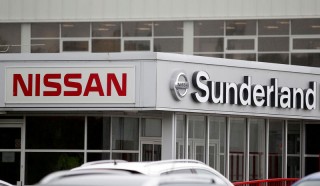Loading
Search
▼ Nissan Warns No-deal Brexit Will Damage British Industry
- Category:Driving
LONDON (Reuters) — Carmaker Nissan said on Thursday there will be “serious implications” for Britain’s manufacturing industry if the country fails to secure a trade deal with the European Union.
With less than six months until Britain is due to exit the EU, Prime Minister Theresa May has yet to find a proposal to maintain economic ties with the bloc that pleases both sides of her divided Conservative party and is acceptable to negotiators in Brussels.
The government has stepped up planning for a so-called no-deal Brexit when the world’s fifth-largest economy leaves the EU on March 29, 2019, a step that could spook financial markets and dislocate trade flows across Europe and beyond.
Nissan, which built nearly a third of Britain’s 1.67 million cars last year, operates the country’s largest automotive factory.
“Today we are among those companies with major investments in the U.K. who are still waiting for clarity on what the future trading relationship between the U.K. and the EU will look like,” Nissan said in a statement.
“As a sudden change from those rules to the rules of the WTO [World Trade Organization] will have serious implications for British industry, we urge U.K. and EU negotiators to work collaboratively towards an orderly balanced Brexit that will continue to encourage mutually beneficial trade.”
If Britain fails to agree a deal with the EU then the country would move from seamless trade with the world’s largest trading bloc to customs arrangements set by the World Trade Organization for external states with no preferential deals.
Britain’s Society of Motor Manufacturers and Traders (SMMT) said last month that tariffs of 10 percent under WTO rules would add an average of €3,000 to the cost of British-built cars sold in the EU if fully passed on to buyers.
Carmakers are worried that port and road delays could slow the movement of finished cars and parts, crippling output and adding costs, if Britain fails to reach agreement with the EU over its departure.
Nissan announced in 2016 that it would build its next generation Qashqai SUV and a new X-Trail model at its Sunderland plant in northern England, in a major boost to Prime Minister Theresa May just a few months after Britain voted to leave the EU.
A source told Reuters that the company had received a letter from the British government promising Nissan extra support in the event that Britain’s departure from the EU hit the competitiveness of the plant.
With less than six months until Britain is due to exit the EU, Prime Minister Theresa May has yet to find a proposal to maintain economic ties with the bloc that pleases both sides of her divided Conservative party and is acceptable to negotiators in Brussels.
The government has stepped up planning for a so-called no-deal Brexit when the world’s fifth-largest economy leaves the EU on March 29, 2019, a step that could spook financial markets and dislocate trade flows across Europe and beyond.
Nissan, which built nearly a third of Britain’s 1.67 million cars last year, operates the country’s largest automotive factory.
“Today we are among those companies with major investments in the U.K. who are still waiting for clarity on what the future trading relationship between the U.K. and the EU will look like,” Nissan said in a statement.
“As a sudden change from those rules to the rules of the WTO [World Trade Organization] will have serious implications for British industry, we urge U.K. and EU negotiators to work collaboratively towards an orderly balanced Brexit that will continue to encourage mutually beneficial trade.”
If Britain fails to agree a deal with the EU then the country would move from seamless trade with the world’s largest trading bloc to customs arrangements set by the World Trade Organization for external states with no preferential deals.
Britain’s Society of Motor Manufacturers and Traders (SMMT) said last month that tariffs of 10 percent under WTO rules would add an average of €3,000 to the cost of British-built cars sold in the EU if fully passed on to buyers.
Carmakers are worried that port and road delays could slow the movement of finished cars and parts, crippling output and adding costs, if Britain fails to reach agreement with the EU over its departure.
Nissan announced in 2016 that it would build its next generation Qashqai SUV and a new X-Trail model at its Sunderland plant in northern England, in a major boost to Prime Minister Theresa May just a few months after Britain voted to leave the EU.
A source told Reuters that the company had received a letter from the British government promising Nissan extra support in the event that Britain’s departure from the EU hit the competitiveness of the plant.
- October 5, 2018
- Comment (0)
- Trackback(0)


